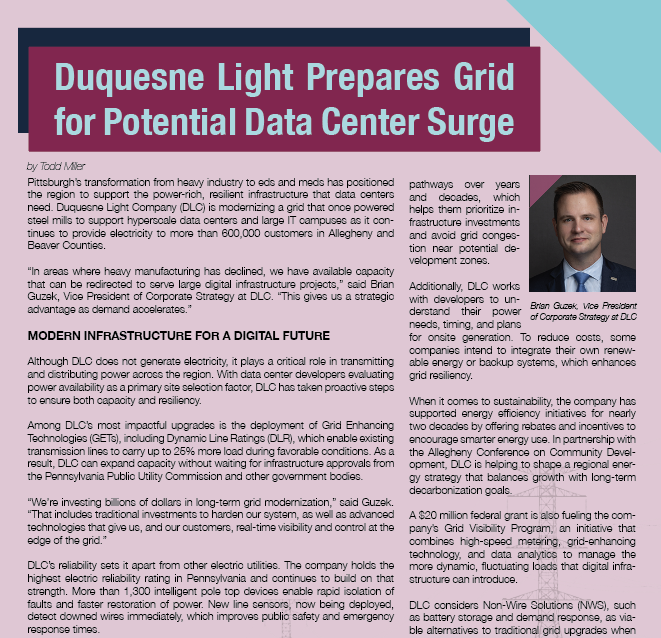Duquesne Light Prepares Grid for Potential Data Center Surge
 Pittsburgh’s transformation from heavy industry to eds and meds has positioned the region to support the power-rich, resilient infrastructure that data centers need. Duquesne Light Company (DLC) is modernizing a grid that once powered steel mills to support hyperscale data centers and large IT campuses as it continues to provide electricity to more than 600,000 customers in Allegheny and Beaver Counties.
Pittsburgh’s transformation from heavy industry to eds and meds has positioned the region to support the power-rich, resilient infrastructure that data centers need. Duquesne Light Company (DLC) is modernizing a grid that once powered steel mills to support hyperscale data centers and large IT campuses as it continues to provide electricity to more than 600,000 customers in Allegheny and Beaver Counties.
“In areas where heavy manufacturing has declined, we have available capacity that can be redirected to serve large digital infrastructure projects,” said Brian Guzek, Vice President of Corporate Strategy at DLC. “This gives us a strategic advantage as demand accelerates.”
Modern Infrastructure for a Digital Future
Although DLC does not generate electricity, it plays a critical role in transmitting and distributing power across the region. With data center developers evaluating power availability as a primary site selection factor, DLC has taken proactive steps to ensure both capacity and resiliency.
Among DLC’s most impactful upgrades is the deployment of Grid Enhancing Technologies (GETs), including Dynamic Line Ratings (DLR), which enable existing transmission lines to carry up to 25% more load during favorable conditions. As a result, DLC can expand capacity without waiting for infrastructure approvals from the Pennsylvania Public Utility Commission and other government bodies.
“We’re investing billions of dollars in long-term grid modernization,” said Guzek. “That includes traditional investments to harden our system, as well as advanced technologies that give us, and our customers, real-time visibility and control at the edge of the grid.”
DLC’s reliability sets it apart from other electric utilities. The company holds the highest electric reliability rating in Pennsylvania and continues to build on that strength. More than 1,300 intelligent pole top devices enable rapid isolation of faults and faster restoration of power. New line sensors, now being deployed, detect downed wires immediately, which improves public safety and emergency response times.
That resiliency is central to DLC’s mission. “It’s not just about meeting the needs of large users like data centers,” said Guzek. “We invest in the grid to ensure consistent, affordable, and reliable service for all customers, from individual households to large facilities.”
Smart Planning, Clean Energy & Grid Innovation
 To plan for future demand, DLC relies on sophisticated scenario modeling and predictive analytics. The utility’s system planning teams simulate multiple growth pathways over years and decades, which helps them prioritize infrastructure investments and avoid grid congestion near potential development zones.
To plan for future demand, DLC relies on sophisticated scenario modeling and predictive analytics. The utility’s system planning teams simulate multiple growth pathways over years and decades, which helps them prioritize infrastructure investments and avoid grid congestion near potential development zones.
Additionally, DLC works with developers to understand their power needs, timing, and plans for onsite generation. To reduce costs, some companies intend to integrate their own renewable energy or backup systems, which enhances grid resiliency.
When it comes to sustainability, the company has supported energy efficiency initiatives for nearly two decades by offering rebates and incentives to encourage smarter energy use. In partnership with the Allegheny Conference on Community Development, DLC is helping to shape a regional energy strategy that balances growth with long-term decarbonization goals.
A $20 million federal grant is also fueling the company’s Grid Visibility Program, an initiative that combines high-speed metering, grid-enhancing technology, and data analytics to manage the more dynamic, fluctuating loads that digital infrastructure can introduce.
DLC considers Non-Wire Solutions (NWS), such as battery storage and demand response, as viable alternatives to traditional grid upgrades when evaluating large new loads. These technologies offer speed, flexibility, and reduced environmental impact.
“Whether it’s hyperscale cloud infrastructure or edge computing, we’re preparing the grid not just for today’s loads, but for tomorrow’s possibilities,” said Guzek. “Pittsburgh has the infrastructure and the foresight to become a leading destination for data center investment.”